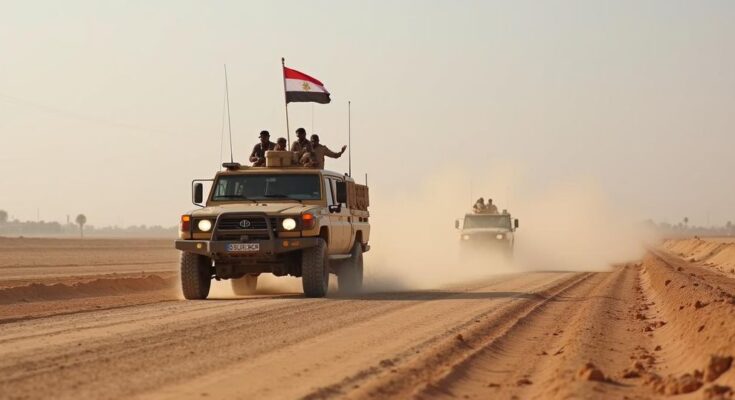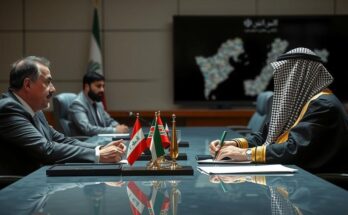Egypt is escalating its military mission in Somalia ahead of the Ethiopian troop withdrawal deadline on December 31. Following a military cooperation agreement, Egypt is training Somali forces against Al Shabab, and aims to replace Ethiopian peacekeepers. Tensions persist over the impact of the Grand Ethiopian Renaissance Dam on Egypt’s water supply and broader geopolitical stability in the Horn of Africa.
Egypt is actively enhancing its military presence in Somalia ahead of the December 31 deadline for the withdrawal of Ethiopian troops stationed there. This initiative, as reported by sources to The National, includes the training and support of Somali security forces in their efforts against militants associated with Al Qaeda. In August, Egypt and Somalia entered into a significant military cooperation agreement, prompting the deployment of Egyptian weapons, military advisers, trainers, and counter-terrorism operators to Mogadishu. It is anticipated that by the year’s end, thousands of Egyptian personnel will be engaged in this military mission. Currently, Ethiopian forces, numbering approximately 22,000, are present in Somalia as part of a bilateral agreement and an African Union peacekeeping operation aimed at combatting the Al Shabab group. Relations between Egypt, Somalia, and Ethiopia have soured, particularly following Ethiopia’s construction of a dam on the Nile River, which Egypt argues will diminish its water supply. Somalia has also expressed concerns regarding a recent agreement between Ethiopia and the breakaway region of Somaliland, which allows Ethiopian access to a port on the Red Sea, infringing on Somalia’s sovereignty. Egypt has expressed its intention to replace Ethiopian peacekeepers in Somalia at the end of the year with Somali forces, a position that has received public support from the Somali government. Reports indicate that some Somali forces, with Egyptian backing, have already been deployed along the supply routes used by Ethiopian troops to prevent any attempts by Addis Ababa to send additional forces before the withdrawal deadline. In response to these developments, Ethiopia has ramped up its military presence in Somalia by deploying an estimated 7,000 additional troops following Egyptian military activities. Ethiopian officials, including President Taye Atske Selassie, have voiced concerns about foreign arms exacerbating security challenges in Somalia, suggesting that such weapons could potentially end up in the hands of terrorist groups. Somali officials have refuted these claims, accusing Ethiopia of concealing its own arms smuggling activities into Somalia. The broader context of this military buildup is intertwined with ongoing tensions surrounding the Grand Ethiopian Renaissance Dam (GERD), a project Cairo perceives as a threat to its water security. Egyptian President Abdel Fattah El Sisi has emphasized the Nile’s significance, stating, “The River Nile, specifically, is an issue that’s associated with the life and survival of Egyptians. It is the chief source of life in our nation.” In light of these tensions, Egypt has also sought to forge closer ties with Eritrea, whose relationship with Ethiopia has been strained in the aftermath of a peace agreement signed in 2018 and a subsequent deal with the Tigray People’s Liberation Front (TPLF) in 2022 that raised security concerns in Asmara.
The situation in the Horn of Africa, particularly involving Egypt, Ethiopia, and Somalia, has been deeply affected by the construction of the Grand Ethiopian Renaissance Dam, which has been a source of significant tension over water rights and usage of the Nile River. Egypt’s historical reliance on the Nile has made it particularly sensitive to developments in upstream Ethiopia, prompting it to forge military cooperation with Somalia. Ethiopia’s military presence in Somalia is part of a wider commitment to stabilize the region against insurgent groups, yet both countries view this presence through contrasting lenses regarding sovereignty and security.
In conclusion, Egypt’s military buildup in Somalia signals its strategic intent to counter Ethiopian influence in the region while securing its own water interests in light of the GERD controversy. The impending withdrawal of Ethiopian troops provides Cairo an opportunity to bolster its support for Somali forces, as it navigates complex regional dynamics characterized by military alliances and competing national interests.
Original Source: www.thenationalnews.com




